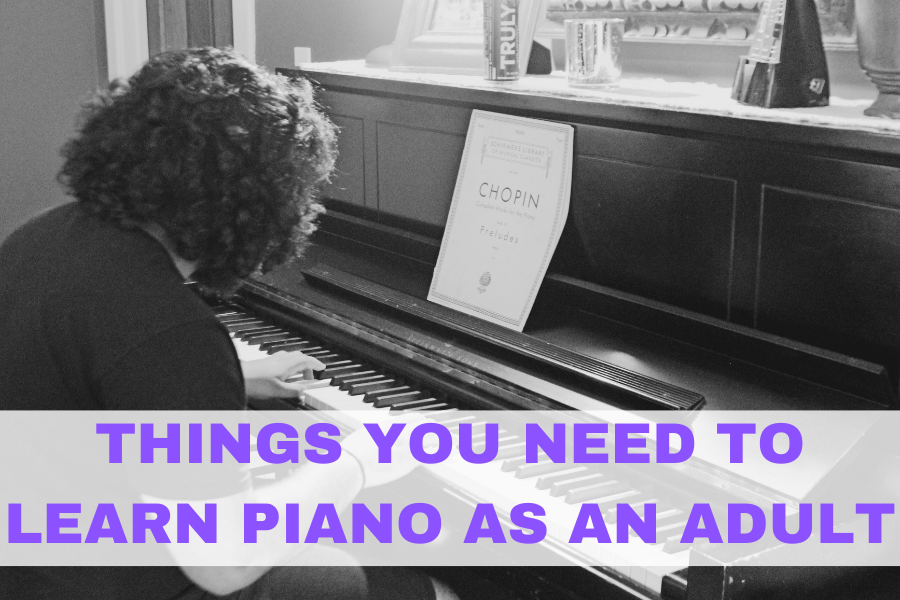5 Things You Need To Learn Piano As an Adult
Learning to play the piano as an adult can be a rewarding and enriching experience. Whether you’re fulfilling a lifelong dream or seeking a new hobby, here are the key things you’ll need to embark on your piano journey. In this blog post, I’m sharing the top five things you need to learn piano as an adult.
Key notes
- A teacher who is familiar with teaching adult students
- A piano or keyboard with weighted keys and 88 keys, if possible
- An all-in-one piano method book
- Patience, patience, patience
- Consistent and efficient practice time
A Teacher
The first thing you need to start your piano journey is a competent teacher who regularly teaches adults. Finding a teacher who understands the needs of late beginner piano students is important to lessen the possibility of being frustrated by activities that are too junior and to move at the proper pace of someone who may desire to make progress quickly. A teacher who takes into account your job and family commitments that can eat into practice time is also important. Once you’ve found a teacher, the next hurdle will be obtaining a spot in their studio. To sign up for a lesson time with me, complete the interest form.
A Keyboard or Piano
The second thing you need to start learning piano as an adult is a keyboard or piano, and other materials such as a metronome, pencil, and key labels. A keyboard can be helpful if you have limited space or are not sure how long you will stick with lessons. While I do not recommend any specific keyboard to purchase, many beginner students who are serious about their study will be successful if using a keyboard that has eighty eight weighted keys. Along with a piano keyboard, a pencil for note-taking, a metronome for keeping time, and removable key labels for help with memorizing key names will be most useful to start with.
A Method Book
The last item in your beginner piano lesson toolbox is a method book. For adults, I recommend the Faber Adult Piano Adventures book. It is easy to follow and incorporates teachings that address music theory, technique, and expression from the start. With the Faber book, you’ll quickly begin working on hand independence and playing familiar melodies. When paired with additional technical exercises and sheet music, it is a wonderful method option for adult students who are learning piano with the help of an in-person teacher and an even better option for students who are self-taught.
Patience
Patience is the best thing to have when beginning piano lessons as an adult. While you may desire to hit the ground running with piano covers and music of the classical greats, it is necessary to dedicate time to working on technique and music theory. These activities can feel rudimentary but are critical to a good foundation as a musician and pianist. Taking the time to play left hand then right hand only, clap rhythms, speak note names, sing melodies, and more will all be necessary to grow into a successful pianist. Remember that slow progress is still progress and practice being patient as you learn.
Practice Time
As an adult, you likely have responsibilities that can pull you away from the piano. Finding a spot in your schedule to dedicate to practice time is important to learning to play. I often teach adult students on a bi-weekly lesson schedule and find that it can increase the amount of time they have to be prepared for lessons. To sign up for bi-weekly lessons, complete the interest form. Using your time wisely when you do sit down to practice is the fastest path to progress. Instead of simply running through your pieces, ensure you practice efficiently by planning what you will focus on within each item you are assigned to work on. For example, in a twenty minute practice session you might plan to warm up for five minutes, pick a specific set of measures and focus on voicing, or bringing out the melodic line, for another five minutes, the left hand for five minutes, and a tricky rhythm or running through the piece with good dynamics for the last five minutes.
Remember, the journey of learning piano as an adult is unique and personal. Embrace the process, enjoy the music, and don’t be afraid to make mistakes. With dedication and the right resources, you’ll be playing your favorite tunes in no time! In this post, I covered what you need to start learning piano as an adult.
This post was all about the five things you need to learn piano as an adult.
